
Cranberries are fruits of evergreen dwarf shrubs of the genus Vaccinium. These low creeping shrubs are up to 2 meters long and 5 to 20 cm high. The fruit of a shrub is a berry that, normally larger than the leaves of the plant. The berry is initially white, but it turns to deep red in color, when fully ripe. The berry is edible, characterized by the acidic taste that sometimes even overwhelms its sweetness.
Use of cranberries
Historically, both the berries and leaves were used for a variety of problems, such as wounds, urinary disorders, diarrhea, diabetes, stomach ailments, and liver problems. In recent times, various cranberry products have been used to prevent and treat urinary tract infections, stomach ulcers, or to prevent dental plaque. Cranberry has also possesses powerful antioxidant and anticancer activity.
Cranberries are commonly used to make various drinks and juices and many other food products, as well as dietary supplements in the form of extracts, capsules, or tablets. Dried cranberries are also very popular and available whole year round. Dried cranberries contain all of the beneficial nutrients from the fresh berry. The only bad point about them is they are usually sweetened. High amounts of sugar is not the healthiest solution. To get the maximum benefits from dry cranberries, one should consume them unsweetened.
Health benefits of dried cranberries
For many years cranberries and cranberry juice have been used to help prevent urinary tract infections. Scientists believed that strong acidity of the cranberries made this positive impact on humans’ health. Modern investigations show that proanthocyanidins, found in cranberries, provide this beneficial effect by acting as a barrier to bacteria that might otherwise latch on to the urinary tract lining.
Cranberries contain powerful anti-inflammatory agents able to prevent infections in the mouth and gums, stomach, and colon.
Regular intake of cranberries has the ability to improve numerous aspects of human immune function, and to lower the frequency of cold and flu symptoms.
The antioxidant components of cranberries play an important role in the cranberry's cardiovascular benefits. By reducing the oxidative stress and chronic inflammation, cranberries can be beneficial to the blood vessels and cardiovascular system. Cranberry's have a special combination of phenolic antioxidants, proanthocyanidin antioxidants, anthocyanin antioxidants, flavonoid antioxidants, and triterpenoid antioxidants. Dietary intake of cranberries can also help to prevent cancer occurrence.Nutritional information
Dried cranberries are often served sweetened. One serving size of cranberries contains somewhere around 100 grams. In this portion there are 308 calories and 82g of total carbohydrates. This makes 27% of recommended daily intake for carbohydrates, and 23% or RDA for dietary fiber. Cranberries are very low in saturated fat, cholesterol and sodium. On the other hand, they are excellent sources of vitamin C, manganese and a good source of manganese and vitamin K. A large portion of the calories in this food comes from sugars.


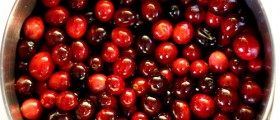
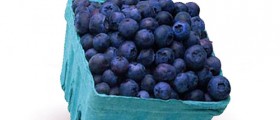





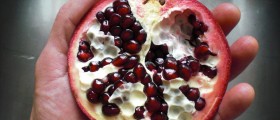




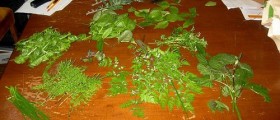

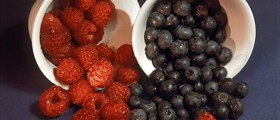
Your thoughts on this
Loading...